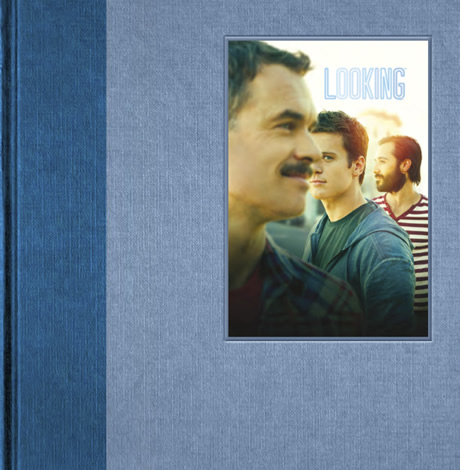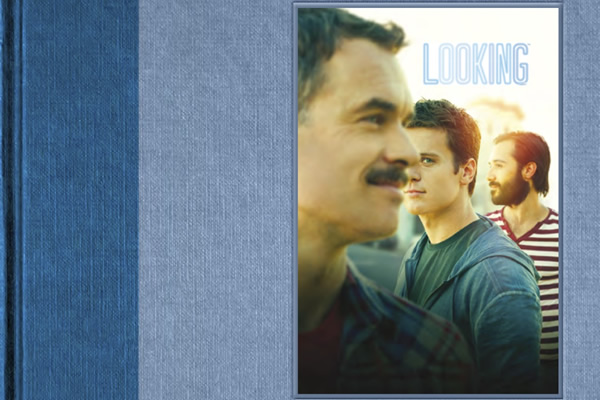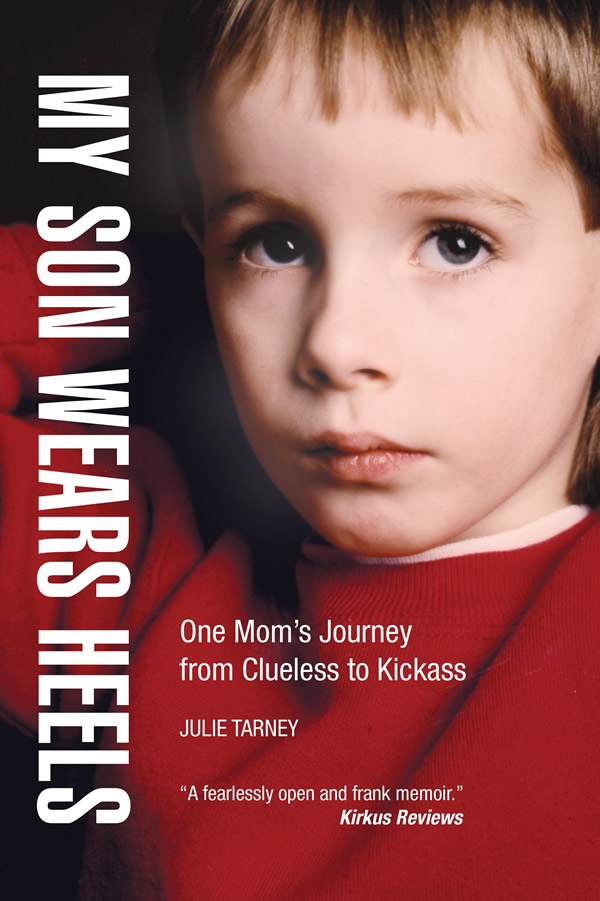Books
FALL ARTS 2016: ‘Looking’ for a good book?
Raising trans kids, Milwaukee’s gay history, queer Alaskan poets and more


The ‘Looking’ coffeetable book features scenes from the memorable HBO series. (Photo courtesy First Third Books)
Before it was possible to Google terms like “gender creative,” Julie Tarney had to trust her instincts when her 2-year-old son Harry told her in 1992, “Inside my head I’m a girl.” “My Son Wears Heels: One Mom’s Journey from Clueless to Kickass” (out this week for $24.95) is Tarney’s story of unwavering support for her son by listening carefully, keeping an open mind, and putting Harry’s happiness before society’s edicts.
Originally chronicled in a serialized national column in the Guardian newspaper in the U.K., “Trans: A Memoir by Juliet Jacques” (out Nov. 15, $19.95) provides an insider’s insight into gender politics and how popular media is either ignoring or distorting the transgender movement. Jacques also provides a completely honest account of her sex reassignment surgery at the age of 30 and the journey to redefine her life for her family, her friends and herself.
“Before Pictures” by Douglas Crimp (out Sept. 22, $39) ticks all the boxes for anyone who has followed the long career of art critic Crimp, who famously coined the term “The Pictures Generation” in reference to the postmodern work of artists like Sherrie Levine and Cindy Sherman during the 1970s and ‘80s. The memoir follows his experiences as a young gay man in New York City in the 1960s, partying alongside the Warhol crowd, and eventually becoming an activist as AIDS began to devastate both the gay and arts communities.
Running parallel to Crimp’s memoir, “Life and Death on the New York Dance Floor, 1980-1983” by Tim Lawrence (out Sept. 30, $27.95) examines the intersection of New York City’s party and arts scenes in the early ‘80s, a world of intense creativity, risk and cultural crossover. Lawrence’s history outlines the convergence of disco, punk, hip hop, salsa and jazz with performance and visual art, video, film and fashion, all leading to the development of 21st century dance music.
Having “Looking” withdrawal now that the series and movie are over? Savor memories of the uber-gay HBO series with a coffeetable book of photos from the show. It’s out in October in two versions — one for $59 and another for $88 that features a DVD with interviews, behind-the-scenes footage from the movie and a signed cast photo. Jump fast if you’re interested — only 500 copies of each version are being issued. Details at firstthirdbooks.com.
While New York or San Francisco might seem like the epicenters of America’s gay rights movement, “LGBT Milwaukee (Images of Modern America)” by Michail Takach ($22.99) seeks to correct that notion, highlighting the history of gay and lesbian culture that was evolving in the Rust Belt city of Milwaukee from the early 1960s. As part of the Wisconsin LGBT History Project, the book’s 150 photographs with detailed captions focus on secret back room hangouts to mega-discos to drag queen culture.
“Becoming Who I Am: Young Men on Being Gay” (out Sept. 19; $27.95) is the result of extensive interviews with about 40 young gay men whose average age is 20. Author Ritch C. Savin-Williams explores their first inklings of same-sex attraction, first sexual experiences and their thoughts on love and long-term relationships.
Young Adult, or YA, fiction is the fastest-growing segment of the publishing market, continuing to offer sophisticated stories and viewpoints that are just as interesting for the over-18 reader. “You Know Me Well” by David Levithan and Nina LaCour ($18.99) is a coming-of-age story set in San Francisco during Pride Week, as two high school classmates, Mark and Kate, who have never spoken, suddenly run into each other one night in the city while avoiding the people they want to be with. Mark is struggling with his unrequited feelings for his best friend Ryan, while Kate is fearful of finally meeting the girl she’s loved from afar.
Tippi Hedren, one of the most famous Hitchcock blondes, releases her memoir “Tippi: a Memoir” ($28.99) on Nov. 1.
“Girl Mans Up” by M-E Girard (released this month, $17.99) is another YA title that will resonate as Pen tries to navigate a world where the cultural expectations from people around her, from her parents to her friends, make it difficult for her to simply be who she is — a girl who isn’t interested in looking feminine, has strong feelings for other girls, and, at the heart of it all, is still a girl at the end of the day who doesn’t want to pretend to be something she’s not.
“It Looks Like This” (out this month, $16.99) by debut author Rafi Mittlefehldt is a tale of first love and loss, following Mike as he and his family move to a new city and he starts at a new high school, constantly urged by his father to give up art for sports as he befriends new kid Sean. Ultimately hopeful, the story doesn’t shy away from the fear that compels parents to send their kids to “straight camp” or the bittersweet need for acceptance from the people we love.
Flynn’s girlfriend is missing, but that’s the least of his problems in “Last Seen Leaving” by Caleb Roehrig (Oct. 4; $17.99). This suspenseful mystery forces Flynn to confront his own demons while being scrutinized by cops and friends, with wit, grit and realism.
“Murder Ink” (Oct. 1; $14.99) is the first offering in the Dakota Jones, P.I. Mystery series, as Jones, the owner of Runaway Investigations, tries to spend a quiet holiday with her girlfriend Kris, a homicide officer, until Kris gets caught up in the investigation of the sordid murder of the proprietor of Fantasy Escorts, who Jones once worked for, back in the old days.
Alaska may, indeed, seem like another country, a place where people go to reinvent themselves in a fresh landscape, as evident in “Building Fires in the Snow: A Collection of Alaska LGBTQ Short Fiction and Poetry” (out this week, $29.95). The anthology gathers stories and poems from across the wide spectrum of Alaska’s LGBT community, shining a light on the everyday lives of gay and lesbian individuals and families within a historically diverse culture.
“The Sea Is Quiet Tonight: a Memoir” by Michael H. Ward (Nov. 1, $19.99) is, by turns, a painful reminder and inspiration tale of both the love and loss experienced by so many during the early years of the AIDS epidemic. Ward details his partner Mark’s diagnosis and death with honesty, delving into the closeness that can develop between partners, family and friends, even as death is imminent.
Using a collection of characters from pop culture, activism, and academia, “Queer: A Graphic History” by Meg-John Barker and Julia Scheele (Nov. 15, $17.95) uses the graphic novel to guide readers through the history of identity politics, queer theory and gender roles. Fresh interpretations and clever illustrations help bring new life to academic constructs and an understanding of the intersection of biology, psychology, and modern culture.

‘My Son Wears Heels’ by Julie Tarney tells of her experiences raising a gender non-conforming son. (Photo courtesy University of Wisconsin Press)
Books
New book explores homosexuality in ancient cultures
‘Queer Thing About Sin’ explains impact of religious credo in Greece, Rome

‘The Queer Thing About Sin’
By Harry Tanner
c.2025, Bloomsbury
$28/259 pages
Nobody likes you very much.
That’s how it seems sometimes, doesn’t it? Nobody wants to see you around, they don’t want to hear your voice, they can’t stand the thought of your existence and they’d really rather you just go away. It’s infuriating, and in the new book “The Queer Thing About Sin” by Harry Tanner, you’ll see how we got to this point.
When he was a teenager, Harry Tanner says that he thought he “was going to hell.”
For years, he’d been attracted to men and he prayed that it would stop. He asked for help from a lay minister who offered Tanner websites meant to repress his urges, but they weren’t the panacea Tanner hoped for. It wasn’t until he went to college that he found the answers he needed and “stopped fearing God’s retribution.”
Being gay wasn’t a sin. Not ever, but he “still wanted to know why Western culture believed it was for so long.”
Historically, many believe that older men were sexual “mentors” for teenage boys, but Tanner says that in ancient Greece and Rome, same-sex relationships were common between male partners of equal age and between differently-aged pairs, alike. Clarity comes by understanding relationships between husbands and wives then, and careful translation of the word “boy,” to show that age wasn’t a factor, but superiority and inferiority were.
In ancient Athens, queer love was considered to be “noble” but after the Persians sacked Athens, sex between men instead became an acceptable act of aggression aimed at conquered enemies. Raping a male prisoner was encouraged but, “Gay men became symbols of a depraved lack of self-control and abstinence.”
Later Greeks believed that men could turn into women “if they weren’t sufficiently virile.” Biblical interpretations point to more conflict; Leviticus specifically bans queer sex but “the Sumerians actively encouraged it.” The Egyptians hated it, but “there are sporadic clues that same-sex partners lived together in ancient Egypt.”
Says Tanner, “all is not what it seems.”
So you say you’re not really into ancient history. If it’s not your thing, then “The Queer Thing About Sin” won’t be, either.
Just know that if you skip this book, you’re missing out on the kind of excitement you get from reading mythology, but what’s here is true, and a much wider view than mere folklore. Author Harry Tanner invites readers to go deep inside philosophy, religion, and ancient culture, but the information he brings is not dry. No, there are major battles brought to life here, vanquished enemies and death – but also love, acceptance, even encouragement that the citizens of yore in many societies embraced and enjoyed. Tanner explains carefully how religious credo tied in with homosexuality (or didn’t) and he brings readers up to speed through recent times.
While this is not a breezy vacation read or a curl-up-with-a-blanket kind of book, “The Queer Thing About Sin” is absolutely worth spending time with. If you’re a thinking person and can give yourself a chance to ponder, you’ll like it very much.
Books
‘The Director’ highlights film director who collaborated with Hitler
But new book omits gay characters, themes from Weimar era

‘The Director’
By Daniel Kehlmann
Summit Books, 2025
Garbo to Goebbels, Daniel Kehlmann’s historical novel “The Director” is the story of Austrian film director G.W. Pabst (1885-1967) and his descent down a crooked staircase of ambition into collaboration with Adolph Hitler’s film industry and its Minister of Propaganda Joseph Goebbels. Kehlmann’s historical fiction is rooted in the world of Weimar German filmmaking and Nazi “Aryan” cinema, but it is a searing story for our challenging time as well.

Pabst was a legendary silent film director from the Weimar Republic’s Golden Era of filmmaking. He “discovered” Greta Garbo; directed silent screen star Louise Brooks; worked with Hitler’s favored director Leni Riefenstahl (“Triumph of the Will”); was a close friend of Fritz Lang (“Metropolis”); and lived in Hollywood among the refugee German film community, poolside with Billy Wilder (“Some Like it Hot”) and Fred Zinnemann (“High Noon”) — both of whose families perished in the Holocaust.
Yet, Pabst left the safety of a life and career in Los Angeles and returned to Nazi Germany in pursuit of his former glory. He felt the studios were giving him terrible scripts and not permitting him to cast his films as he wished. Then he received a signal that he would be welcome in Nazi Germany. He was not Jewish.
Kehlmann, whose father at age 17 was sent to a concentration camp and survived, takes the reader inside each station of Pabst’s passage from Hollywood frustration to moral ruin, making the incremental compromises that collectively land him in the hellish Berlin office of Joseph Goebbels. In an unforgettably phantasmagoric scene, Goebbels triples the stakes with the aging filmmaker, “Consider what I can offer you….a concentration camp. At any time. No problem,” he says. “Or what else…anything you want. Any budget, any actor. Any film you want to make.” Startled, paralyzed and seduced by the horror of such an offer, Pabst accepts not with a signature but a salute: “Heil Hitler,” rises Pabst. He’s in.
The novel develops the disgusting world of compromise and collaboration when Pabst is called in to co-direct a schlock feature with Hitler’s cinematic soulmate Riefenstahl. Riefenstahl, the “Directress” is making a film based on the Fuhrer’s favorite opera. She is beautiful, electric and beyond weird playing a Spanish dancer who mesmerizes the rustic Austrian locals with her exotic moves. The problem is scores of extras will be needed to surround and desire Fraulein Riefenstahl. Mysteriously, the “extras” arrive surprising Pabst who wonders where she had gotten so many young men when almost everyone was on the front fighting the war. The extras were trucked in from Salzburg, he is told, “Maxglan to be precise.” He pretends not to hear. Maxglan was a forced labor camp for “racially inferior” Sinti and Roma gypsies, who will later be deported from Austria and exterminated. Pabst does not ask questions. All he wants is their faces, tight black and white shots of their manly, authentic, and hungry features. “You see everything you don’t have,” he exhorts the doomed prisoners to emote for his camera. Great art, he believes, is worth the temporal compromises and enticements that Kehlmann artfully dangles in the director’s face. And it gets worse.
One collaborates in this world with cynicism born of helpless futility. In Hollywood, Pabst was desperate to develop his own pictures and lure the star who could bless his script, one of the thousands that come their way. Such was Greta Garbo, “the most beautiful woman in the world” she was called after being filmed by Pabst in the 1920s. He shot her close-ups in slow motion to make her look even more gorgeous and ethereal. Garbo loved Pabst and owed him much, but Kehlmann writes, “Excessive beauty was hard to bear, it burned something in the people around it, it was like a curse.”
Garbo imagined what it would be like to be “a God or archangel and constantly feel the prayers rising from the depths. There were so many, there was nothing to do but ignore them all.” Fred Zinnemann, later to direct “High Noon”, explains to his poolside guest, “Life here (in Hollywood) is very good if you learn the game. We escaped hell, we ought to be rejoicing all day long, but instead we feel sorry for ourselves because we have to make westerns even though we are allergic to horses.”
The texture of history in the novel is rich. So, it was disappointing and puzzling there was not an original gay character, a “degenerate” according to Nazi propaganda, portrayed in Pabst’s theater or filmmaking circles. From Hollywood to Berlin to Vienna, it would have been easy to bring a sexual minority to life on the set. Sexual minorities and gender ambiguity were widely presented in Weimar films. Indeed, in one of Pabst’s films “Pandora’s Box” starring Louise Brooks there was a lesbian subplot. In 1933, when thousands of books written by, and about homosexuals, were looted and thrown onto a Berlin bonfire, Goebbels proclaimed, “No to decadence and moral corruption!” The Pabst era has been de-gayed in “The Director.”
“He had to make films,” Kehlmann cuts to the chase with G.W. Pabst. “There was nothing else he wanted, nothing more important.” Pabst’s long road of compromise, collaboration and moral ruin was traveled in small steps. In a recent interview Kehlmann says the lesson is to “not compromise early when you still have the opportunity to say ‘no.’” Pabst, the director, believed his art would save him. This novel does that in a dark way.
(Charles Francis is President of the Mattachine Society of Washington, D.C., and author of “Archive Activism: Memoir of a ‘Uniquely Nasty’ Journey.”)
The Blade may receive commissions from qualifying purchases made via this post.
Books
‘The Vampire Chronicles’ inspire LGBTQ people around the world
AMC’s ‘Interview with the Vampire’ has brought feelings back to live

Four kids pedaled furiously, their bicycles wobbling over cracked pavement and uneven curbs. Laughter and shouted arguments about which mystical creature could beat which echoed down the quiet street. They carried backpacks stuffed with well-worn paperbacks — comic books and fantasy novels — each child lost in a private world of monsters, magic, and secret codes. The air hummed with the kind of adventure that exists only at the edge of imagination, shaped by an imaginary world created in another part of the planet.
This is not a description of “Stranger Things,” nor of an American suburb in the 1980s. This is a small Russian village in the early 2000s — a place without paved roads, where most houses had no running water or central heating — where I spent every summer of my childhood. Those kids were my friends, and the world we were obsessed with was “The Vampire Chronicles” by Anne Rice.
We didn’t yet know that one of us would soon come out as openly bi, or that another — me — would become an LGBTQ activist. We were reading our first queer story in Anne Rice’s books. My first queer story. It felt wrong. And it felt extremely right. I haven’t accepted that I’m queer yet, but the easiness queerness was discussed in books helped.
Now, with AMC’s “Interview with the Vampire,” starring Jacob Anderson as Louis de Pointe du Lac — a visibly human, openly queer, aching vampire — and Sam Reid as Lestat de Lioncourt, something old has stirred back to life. Louis remains haunted by what he is and what he has done. Lestat, meanwhile, is neither hero nor villain. He desires without apology, and survives without shame.
I remember my bi friend — who was struggling with a difficult family — identifying with Lestat. Long before she came out, I already saw her queerness reflected there. “The Vampire Chronicles” allowed both of us to come out, at least to each other, with surprising ease despite the queerphobic environment.
While watching — and rewatching — the series over this winter holiday, I kept thinking about what this story has meant, and still means, for queer youth and queer people worldwide. Once again, this is not just about “the West.” I read comments from queer Ukrainian teenagers living under bombardment, finding joy in the show. I saw Russian fans furious at the absurdly censored translation by Amediateca, which rendered “boyfriend” as “friend” or even “pal,” turning the central relationship between two queer vampires into near-comic nonsense. Mentions of Putin were also erased from the modern adaptation — part of a broader Russian effort to eliminate queer visibility and political critique altogether.
And yet, fans persist to know the real story. Even those outside the LGBTQ community search for uncensored translations or watch with subtitles. A new generation of Eastern European queers is finding itself through this series.
It made me reflect on the role of mass culture — especially American mass culture — globally. I use Ukraine and Russia as examples because I’m from Ukraine, spent much of my childhood and adolescence in Russia, and speak both languages. But the impact is clearly broader. The evolution of mass culture changes the world, and in the context of queer history, “Interview with the Vampire” is one of the brightest examples — precisely because of its international reach and because it was never marketed as “gay literature,” but as gothic horror for a general audience.
With AMC now producing a third season, “The Vampire Lestat,” I’ve seen renewed speculation about Lestat’s queerness and debates about how explicitly the show portrays same-sex relationships. In the books, vampires cannot have sex in a “traditional” way, but that never stopped Anne Rice from depicting deeply homoromantic relationships, charged with unmistakable homoerotic tension. This is, after all, a story about two men who “adopt” a child and form a de facto queer family. And this is just the first book — in later novels we see a lot of openly queer couples and relationships.
The first novel, “Interview with the Vampire” was published in 1976, so the absence of explicit gay sex scenes is unsurprising. Later, Anne Rice — who identified as queer — described herself as lacking a sense of gender, seeing herself as a gay man and viewing the world in a “bisexual way.” She openly confirmed that all her vampires are bisexual: a benefit of the Dark Gift, where gender becomes irrelevant.
This is why her work resonates so powerfully with queer readers worldwide, and why so many recognize themselves in her vampires. For many young people I know from Eastern Europe, “Interview with the Vampire” was the first book in which they ever encountered a same-sex relationship.
But the true power of this universe lies in the fact that it was not created only for queer audiences. I know conservative Muslims with deeply traditional views who loved “The Vampire Chronicles” as teenagers. I know straight Western couples who did too. Even people who initially found same-sex relationships unsettling often became more tolerant after reading the books, watching the movie or the show. It is harder to hate someone who reminds you of a beloved character.
That is the strength of the story: it was never framed as explicitly queer or purely romantic, gothic and geeky audiences love it. “The Vampire Chronicles” are not a cure for queerphobia, but they are a powerful tool for making queerness more accessible. Popular culture offers a window into queer lives — and the broader that window, the more powerful it becomes.
Other examples include Will from “Stranger Things,” Ellie and Dina from “The Last of Us” (both the game and the series), or even the less mainstream but influential sci-fi show “Severance.” These stories allow audiences around the world to see queer people beyond stereotypes. That is the power of representation — not just for queer people themselves, but for society as a whole. It makes queer people look like real people, even when they are controversial blood-drinkers with fangs, or two girls surviving a fungal apocalypse.
Mass culture is a universal language, spoken worldwide. And that is precisely why censorship so often tries — and fails — to silence it.




















